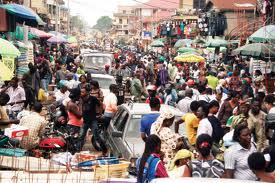The Nigerian economy recorded a GDP growth of 6.28 per cent in the second quarter of this year, driven by non-oil sector growth, while inflation fell for the second straight month in August as a result of tight monetary policy.

According to the report, the growth was lower than 7.61 per cent recorded in the same period of 2011.
The oil sector contributed 13.86 per cent to real GDP, while the non-oil sector added 7.50 per cent in real terms.
“The non-oil sector was driven by growth in activities recorded in the building and construction sector, while oil sector output decreased (compared with Q2 2011),” the NBS said in a report on Sunday.
The nation’s economy is expected to expand at a slower rate this year, after rising 7.4 percent in 2011, due to disruptions to oil production and economic weakness in developed countries that buy its gasoline-rich crude.
Consumer inflation eased to 11.7 percent year-on-year in August, down from 12.8 percent in July, largely due to a fall in food inflation which dropped to 9.9 percent in August from 12.1 percent the previous month, NBS said.
Average crude oil output rose marginally to 2.38 million barrels per day (bpd) in the second quarter, from 2.35 million bpd in the first quarter. This was down from 2.45 million bpd in the second quarter last year.
Oil accounts for more than 80 percent of Nigerian government revenue and around 95 percent of its foreign exchange earnings.
Taming inflation
According to the NBS, high interest rates and lower food prices had helped temper inflation.
“The relative moderation in the index is attributable to the relative slower rises in both the Food and ‘core’ indices partly as a result of aggressive monetary policy initiatives by the Central Bank of Nigeria (CBN) base effects and a much lower rise in several food prices,” the bureau said.
As the CBN monetary policy committee meets today, the inflation numbers will feed some private sector demand for a loosening of monetary policy, and most analysts are expecting rates to remain at 12 percent, as they have been since November last year.
The rate decision will be announced on Tuesday.

